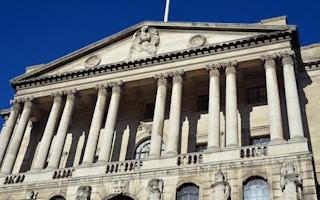This week something happened which, in other times, would have seemed extraordinary: the Bank of England told British banks not to pay out shareholder dividends and to cancel bankers’ bonuses, as part of their contribution to the collective response to the coronavirus crisis.
And the banks agreed, seemingly with no argument.
Of course, many of us would say that it’s the least they can do, to make sure that they have sufficient resources to support ordinary people and small businesses through the crisis.
Nonetheless, it hints at a sense of social responsibility that has previously been hard to spot in much of the financial sector, but which will be much needed in the months to come.
It remains to be seen how devastating the impacts of the coronavirus will ultimately be. Already about 60,000 lives have been lost, and countless people are losing their jobs, while many more face crippling debt and further uncertainty over their homes and businesses.
“
We must not respond to one crisis, only to fuel another. The vast amounts of money being released into the system will shape our workplaces, services, and communities for years to come—this is a chance to build back better.
The shockwave unleashed by Covid—19 is shaking the foundations of our current economic system like never before, and they are crumbling.
The crisis has also revealed the true backbone of our society, people often overlooked and undervalued: doctors and nurses, grocery staff, teachers, waste collectors, cleaners and care workers, to name but a few.
Leaders of many governments and financial institutions have started pulling every lever available to them to channel finance towards critically underfunded, neglected healthcare and social support systems.
Central banks in more than 50 countries around the world are already taking action, but due to the rapidly escalating international health crisis a major global economic recession seems inevitable.
In deciding how to respond to this, the Bank of England must make sure it doesn’t repeat the mistakes of the past.
The last time the world economy suffered a huge crash, in 2008, the Bank of England responded by pumping money into the financial sector. The result was that lots of support went to big banks, their wealthy shareholders and super-rich companies, especially in carbon-intensive sectors.
Ultimately, a lot of money ended up in tax havens and just sat there gathering interest for the wealthiest. Meanwhile, everyone else footed the bill with ten years of austerity, resulting in people losing their homes, jobs and businesses, strained health services, shrunken social safety nets, and a decade of inaction on the climate crisis.
This time we must have a different approach. Coronavirus is demonstrating just how interconnected we all are, how much we rely on one another and need our communities for mutual support.
Accordingly, our government must not prioritise polluting corporations at the expense of the needs of the people and worsen the existing inequalities in our society that this pandemic is exposing.
The oil and gas industry, one of the wealthiest sectors in the world, is already begging the UK government cap-in-hand for long term financial support in the middle of our present health crisis. Does it deserve a bailout?
This industry has knowingly profited from causing the climate crisis, while exacerbating economic injustice across the globe, weakening our overall resilience to major crises, and it is actively propelling us all towards another major meltdown.
British banks continue to finance more chaos by pouring money into fossil fuel expansion. In the last four years, Barclays and HSBC channeled $110 billion and $85 billion respectively into fossil fuels. This reckless behaviour must be stopped.
Central banks, the referees of the financial sector, are already providing trillions in finance in their response to the pandemic but they need to do all they can to ensure that this is put to good use, both for the immediate crisis response and the longer-term recovery.
We must ensure that this is a real turning point and that these huge interventions help to create a different kind of economy - one that is inherently more stable and sustainable.
The International Labor Organisation forecasts that over 24 million jobs might be lost worldwide due to the coronavirus pandemic. This figure, however, is matched by the 24 million new jobs that investments in the low-carbon transition could create if the resources being mobilised by governments are used to support a Green New Deal.
Under new governor Andrew Bailey, the Bank of England has pledged £200 billion to help stabilise the British economy. Of course, the first priority will be to bolster essential health and welfare services. But as things stand, large amounts will also be spent on corporate bonds in businesses that invest in fossil fuels. This cannot happen.
We must not respond to one crisis, only to fuel another. The vast amounts of money being released into the system will shape our workplaces, services, and communities for years to come—this is a chance to build back better.
To do this, the government and the Bank of England must rebuild our economy in a way that works for everyone. This means strengthening our NHS and care sector, a bold and ambitious programme of investment to tackle inequality, and the guarantee of a clean environment as a basic human right.
It means creating millions of well-paying jobs in sectors that nourish our environment and serve our communities. It also means providing measures that redirect public and private finance away from the climate crisis into a cleaner, more equitable and sustainable economy.
This story was published with permission from Thomson Reuters Foundation, the charitable arm of Thomson Reuters, that covers humanitarian news, climate change, resilience, women’s rights, trafficking and property rights. Visit http://news.trust.org/climate.















